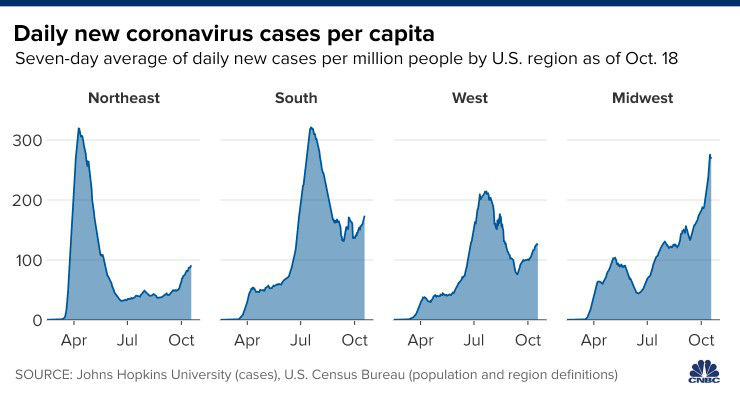




Gold rises on dollar dip, hopes for U.S. relief package
· Gold rose about 1% on Monday as the dollar retreated and as expectations of a U.S. stimulus deal being reached ahead of the presidential elections in November bolstered bullion’s appeal as an inflation hedge.
· Spot gold rose 0.4% to $1,906.36 per ounce. U.S. gold futures settled up 0.3% to $1,911.70.

· Gold is strengthening on the dollar’s downtrend and “the belief that some kind of stimulus package is going to come through in the next 48 hours,” said Phillip Streible, chief market strategist at Blue Line Futures in Chicago. “People believe that we’re going to go into an inflationary period into the next quarter. So they’re starting up front on that.”
· The dollar slipped 0.5% versus rivals, making gold less expensive for holders of other currencies. U.S. House Speaker Nancy Pelosi said on Sunday that differences remained with the Trump administration on a wide-ranging relief package but that she was optimistic legislation could be pushed through before Election Day.
· Gold has gained about 26% so far this year as investors sought refuge from a worsening coronavirus pandemic and also risks of inflation and currency debasement as global central banks slashed interest rates while pumping out unprecedented stimulus to contain the economic blow.
Further underpinning safe-haven demand for bullion were concerns surrounding fresh coronavirus-led restrictions in Europe and elsewhere as worldwide infections crossed over 40 million, as well as uncertainty over the U.S. elections.
· Elsewhere, silver climbed 2.2% to $24.70, having hit a near one-week peak.
· Citi said in a note it expects silver to rally to $40 over the next 12 months, on sustained investor demand and a recovery in industrial consumption in 2021.
· Platinum gained 0.6% to $865.52 per ounce and palladium rose 0.3% to $2,337.94.
· Pelosi and Mnuchin make progress in stimulus talks, plan to speak again Tuesday
House Speaker Nancy Pelosi and Treasury Secretary Steven Mnuchin made progress in their latest coronavirus stimulus talks Monday as time runs short to reach a deal before the 2020 election.
In a nearly one-hour phone call, the pair “continued to narrow their differences,” the California Democrat’s spokesman, Drew Hammill, said in a tweeted statement. Pelosi has directed House committee chairs to work to resolve areas of disagreement with the White House, and the speaker and Mnuchin plan to talk again Tuesday, Hammill added.
· Bostic says the Fed needs to do more to address racial economic impact from the pandemic
The Federal Reserve has a substantial role to play in addressing the racial economic disparities brought about by the coronavirus pandemic, Raphael Bostic, president of the central bank’s Atlanta district, said Monday.
· Fed's Harker: Tolerating higher inflation 'worth it' to help achieve employment goals
Black and Hispanic workers and others in low-wage jobs were just beginning to see their job situation improve before the pandemic hit, wiping out many of those gains, Philadelphia Federal Reserve Bank President Patrick Harker said on Monday.
· Fed's Clarida says U.S. economic recovery has a 'long way to go'
The U.S. economy is rebounding strongly after taking a big hit because of the coronavirus pandemic, but it may be another year before the economy returns to pre-crisis levels and take even longer for the labor market to recoup lost ground, Federal Reserve Vice Chair Richard Clarida said on Monday.
Fed's Clarida says rates will stay near zero until inflation reaches 2%
· Monetary Stability: The IMF and Fed Chair Jerome Powell Discuss Digital Currency Implications
The Fed Chair says as far as a U.S.-issued on crypto assets like central bank digital currencies (CBDC) is concerned, it is “more important to get it right than to be first.”
· Trump says he will take coronavirus test before next debate with Joe Biden
· Trump and Biden will have mics muted for part of last presidential debate
President Donald Trump and Democratic nominee Joe Biden will at times have their microphones temporarily cut during their next debate, the event’s sponsors announced Monday.
· Russia central bank likely to keep rates on hold ahead of U.S. election: Reuters poll
· Asia’s growth will continue to depend on China even as it focuses on domestic economy, experts say
· CORONAVIRUS UPDATES:
Global cases: 40.62M
Global deaths: 1.12M
U.S. cases: 8.45M
U.S. deaths: 225,198
· Midwest leads in new cases per capital

· Wisconsin judge reimposes COVID restrictions as U.S. nursing homes sound alarm
Nursing homes, which were devastated in the early weeks of the pandemic last spring, could soon experience a third spike in cases, said the American Health Care Association and National Center for Assisted Living.
Wisconsin is one of five states where more than 20% of COVID-19 tests are coming back positive. Local health officials last week warned about “very intense community spread in all age groups” as they announced a string of grim records.
· Italy's govt agrees on COVID-19 hard-hit Lombardy region new curbs request: health ministry
· Belgium says COVID-19 situation serious as infections reach new highs, bars close
· COVID vaccine unlikely to be deployed widely in Britain before spring: adviser
There is unlikely to be a vaccine against the coronavirus that is in widespread use in Britain before the spring next year, government chief scientific adviser Patrick Vallance said on Monday.
“(It’s) unlikely we’ll have a vaccine for any sort of widespread use in the community, before at least spring next year,” Vallance told lawmakers.
· Brazil GDP to shrink 4% this year, economy at 'inflection point': officials
· U.S. and Brazil must reduce dependence on China imports: Pompeo
· U.S. sees $18 billion from purchases in nuclear power agreement with Poland
The United States and Poland have struck a nuclear power agreement in which Poland will likely buy $18 billion in nuclear technology from U.S. companies, the U.S. energy department said on Monday.
Reference: CNBC, Reuters, Bitcoin
